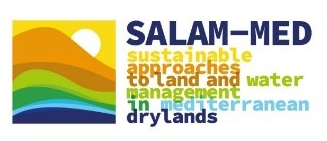 SALAM-MED is a RIA project funded under the PRIMA 2021 Program, section 1. The consortium is coordinated by Prof. Pier Paolo Roggero (Desertification Research Center – University of Sassari) and is composed of an interdisciplinary team of 15 partners from 8 MED countries, involving a network of research organisations, NGOs, SMEs and international organizations, with long-standing collaborative activities across the MED.
SALAM-MED is a RIA project funded under the PRIMA 2021 Program, section 1. The consortium is coordinated by Prof. Pier Paolo Roggero (Desertification Research Center – University of Sassari) and is composed of an interdisciplinary team of 15 partners from 8 MED countries, involving a network of research organisations, NGOs, SMEs and international organizations, with long-standing collaborative activities across the MED.
The project is based on the considerations:
- Soil fertility and water conservation are the preconditions for sustainable development in drylands;
- Desertification drought and land degradation emerge from complex social-ecological systems with biophysical and social drivers as structurally coupled requiring systemic innovation;
- The Mediterranean basin is a mosaic of different contexts that require tailored solutions and not one solution for all.
SALAM-MED is focused on land degradation and desertification in Mediterranean drylands, combining the development and tailoring of novel technologies/practical solutions for sustainable land and water management; and the design and implementation of innovative modalities for connecting scientists, end users, SMEs and NGOs with decision makers and other stakeholders. On this framework, the project pursues four strategic goals:
- Identify and evaluate nature-based technological solutions to increase the resilience of Mediterranean ecosystems at risk of desertification.
- Increase the resilience of rural communities to climatic and context-related pressures that are leading to depopulation and ecosystem degradation.
- Engage local communities (especially women and young people) in the project’s “Living Labs” to foster the integration of knowledge and the field testing of new solutions.
- Generate new business opportunities structurally coupled with sustainable land management.
SALAM-MED will investigate on new nature-based technologies (e.g., soil water retention technologies, managed aquifer recharge, microbial-based biotechnological solutions, digital technologies for grazing systems, etc.) for improving the resilience or recovering soil fertility of a wide range of Mediterranean ecosystems including silvopastoral systems. Six Living Labs will be implemented for opening new social learning spaces between researchers and local stakeholders situated in areas at risk of desertification: Italy, Spain, Greece, Morocco, Egypt and Tunisia. The expected outcome of the living lab process SALAM MED will generate economic and business opportunities and will scale-out results and practical solutions in other Mediterranean ecosystems with similar characteristics.
The project is also promoting cross-cutting technologies, particularly those based on digital platforms for high-throughput phenotyping and precision agriculture implemented by CNR-IPSP in Florence, developed to screen a large number of genotypes of different crops as well as for remote sensing to monitor and improve hydrology and soil fertility.
Source of funding: European Commission – PRIMA Programme (H2020)
Role of CNR-IPSP: Partner
CNR-IPSP Scientific Responsible: Mauro Centritto
CNR-IPSP members and staff involved: Raffaella Maria Balestrini, Matthew Haworth, Giovanni Marino, Giulia Atzori, Cecilia Brunetti, Andre Daccache, Adriano Conte, Vincenzo Montesano, André Pierre Marie Fabbri, Francesca Alderotti, Valentina Lazazzara, Sabrina Mazzoni, Felicia Menicucci, Maddalena Grieco, Valeria Palchetti
Start date: April 2022
End date: November 2025
Partnership:
- Desertification Research Center (NRD), University of Sassari – IT
- Department of Agriculture, Food, Environment and Forestry (DAGRI), University of Florence – IT
- Institute for Sustainable Plant Protection (CNR-IPSP), National Research Council of Italy – IT
- International Centre for Advanced Mediterranean Agronomic Studies (CIHEAM) – FR
- Desert Research Center (DRC) – EG
- Institut des Régions Arides (IRA) – TN
- Research Centre for Atmospheric Physics and Climatology, Academy of Athens (AoA) – GR
- Center for Agro-food Economics and Development (CREDA) – ES
- Cadi Ayyad University – Faculty of Sciences (UCA) – MO
- Polytechnic University of Valencia (UPV) – ES
- Médenine Agro Tech (MAT) – TN
- Abinsula (ABIES) – ES
- Primo Principio (2P) – IT
- WeWorld-GVC (WW-GVC) (in kind) – PS
- DesertNet International (DNI) (in kind)
- FAO – RNE (dissemination partner)
Official Project website: https://www.salam-med.org/
